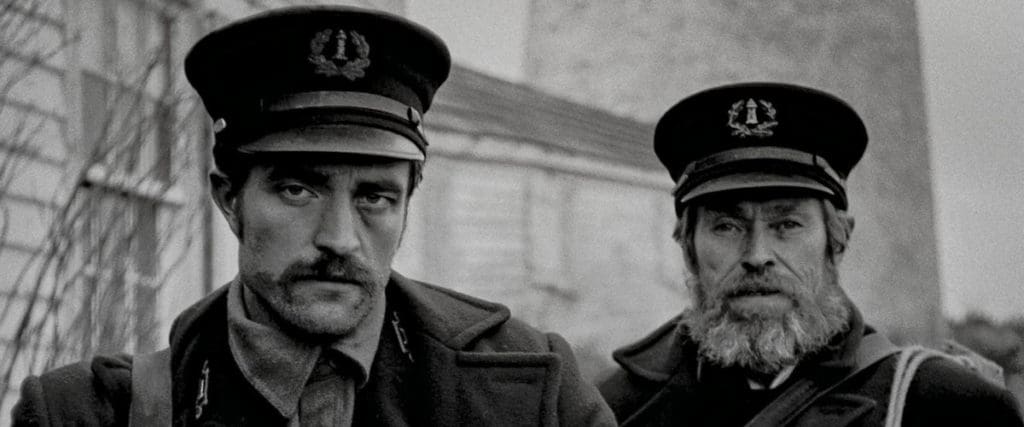
The Lighthouse feels something like a dream. It establishes its own rules quickly and quietly, never announcing its own interior logic but moving through it with such authority that you can follow along as if you made up the universe yourself. Its dialogue, meticulously constructed by screenwriters Max and Robert Eggers from historical documents dating back to the 19th century, doesn’t always make sense, yet the film is somehow easy to follow. You don’t need to hear every word because the emotion behind the language is so easily felt. And its sudden bursts of violence, sometimes tied into bizarrely erotic imagery, is enough to make you jolt up in a cold sweat.
Robert Eggers also directs this hallucinatory tale of maritime horror—which raises his impressive batting average to two cinematic masterpieces out of two at-bats at the plate. His debut, The Witch, is impressive enough as a first foray into filmmaking but, stripped of that context, it’s a stunning domestic drama that weaves horror imagery into a story that explores the dangers of religion and the way its been used to repress women. In The Lighthouse, Eggers turns his attention to masculinity. This is a two-man show (for the most part…) about the power struggles that seem destined to unfold when boys are left to their own devices.
The boys in question are Ephraim (Robert Pattinson) and Thomas (Willem Dafoe), two lighthouse keepers tasked with minding a small island for a few weeks in the midst of a terrible storm. Ephraim is still learning the trade, having recently run away from the timber industry. He’s quiet, curious, and maybe a little lonely (or is he just horny?). Thomas, meanwhile, is an experienced keeper who has no problem chewing Ephraim out, and can always be found with a drink in his hand. Thomas seems strangely uninterested in minding their post, perhaps too accustomed to having his subordinate do the work for him. But he’s absolutely fixated on the light itself, spending most nights at the top of the tower by himself. Doing… what, exactly?
To spoil more about what unfolds would be a disservice to the viewing experience, but to tiptoe around the plot itself: there are two very different stories unfolding in The Lighthouse. One is a supernatural tale, filled with frightening imagery that feels plucked from a nightmare and seamlessly blended into an otherwise realistic narrative. These moments are brief but effective, often coming out of nowhere and sending chills down the viewer’s spine (partially because of the brilliant sound design). But the main narrative is one about masculinity, and a Dom/sub power dynamic that blurs the line between sexual and platonic as it constantly heads in unexpected directions.
It’s a little too easy to compare the film to a Hemingway short story…but it’s not entirely wrong. This is a story about a very specific sort of masculinity: the brute, unexamined, angry kind that dominated literature in the early 20th century. But, in part because of the film’s genre trappings, there are elements of Tennessee Williams. As the relationship these two men share becomes more and more twisted, a bizarre but fascinating sexual element gets introduced. These men are lonely, and they’re also completely unwilling to cede any power to the another. Any potential opportunity they have to exert power over the other is explored.
As a director, Eggers masterfully holds these dual stories and quietly ties them together until the truly insane third act. It’s a tricky tone to handle—likely made worse from what must have been terrible working conditions. But this film feels so effortlessly well-made that it almost feels unbelievable that it’s only his second film. Other technical elements, including reference point cinematography from Jarin Blaschke, are similarly flawless.
The performances are also technically impressive, as is necessary for a film where only two actors make up a majority of the screentime. This is a classic Willem Dafoe performance that finds the actor emphasizing all his bizarre quirks and freaky characteristics, whether he’s screaming a monologue that’s as commanding as it is difficult to understand, or just laughing in Pattinson’s face. This is also a truly impressive display of Pattinson’s talent, as the young actor is tasked with repeatedly doing strange and unusual things on camera that would be difficult for any actor to sell. Pattinson has been building a filmography of unusual roles for the last few years, but this still feels like a risk that pays off.
But really, this is Eggers’ show. As was the situation with The Witch in 2016, this feels like an exciting announcement of a director whose career will be filled with memorable movies. He’s already so in command of his craft, with two films that feel unique to his vision but also so vital to the horror cannon. Watching his new movie is just as exciting as thinking of what he’ll do next.

